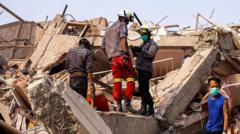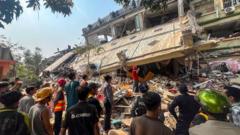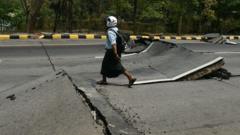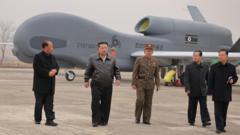In a recent visit to the presidential palace, Sudan's military leader, General Abdel Fattah al-Burhan, declared Khartoum "free" from the paramilitary Rapid Support Forces (RSF) after the army regained control of the capital. However, despite this significant military gain, the broader conflict continues, with ongoing violence and humanitarian concerns reported across the country.
Sudan Military Claims Control of Khartoum as Conflict Rages On
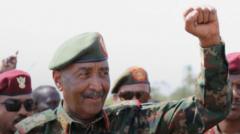
Sudan Military Claims Control of Khartoum as Conflict Rages On
General Abdel Fattah al-Burhan announces the army's recapture of Khartoum from the Rapid Support Forces amid ongoing violence and humanitarian crises.
Sudan's military leader, General Abdel Fattah al-Burhan, made a historic visit to the presidential palace in Khartoum, having declared that the army has fully regained control of the capital from the paramilitary group known as the Rapid Support Forces (RSF). Burhan's declaration of Khartoum as "free" follows the army's successful operation to recapture critical state institutions and the international airport, marking the first time he has returned to the palace since the conflict erupted nearly two years ago.
During his visit, which saw him greeted by soldiers in a show of triumph, Burhan emphasized the significance of this milestone for a military government that had previously been forced to relocate to Port Sudan. The RSF had maintained control over much of Khartoum since the war began in April 2023, leading to devastating humanitarian consequences, with thousands of lives lost and millions displaced.
As the army continues operations in the capital, commanders have reported the successful reclamation of key infrastructure, including all bridges that connect the three cities of Greater Khartoum, as well as a major military camp in Jebel Awliya. Reports indicate that RSF fighters are retreating south as the conflict escalates, further complicating the situation in the capital. Drone footage and social media videos have shown civilians reacting to the army's advances with celebrations, yet they also highlight the dire situation for those still trapped in the conflict.
Residents of Khartoum have recounted the RSF's mass looting and occupation of civilian homes against a backdrop of acute food shortages and near-famine conditions exacerbated by looted markets and restricted access to humanitarian aid. Rights groups have raised alarms over increasing reports of sexual violence and other abuses, as both the RSF and army have faced accusations of indiscriminate shelling of civilian areas.
Recent air force bombardments reportedly led to civilian casualties in bustling markets, intensifying concerns over the humanitarian impact of the ongoing conflict. While the army's recapture of Khartoum presents a potential shift in the war's dynamics, analysts caution that the RSF still holds significant power in the Darfur region and the conflict is far from resolution, complicated by foreign influence and repeated failures in international peace initiatives.


